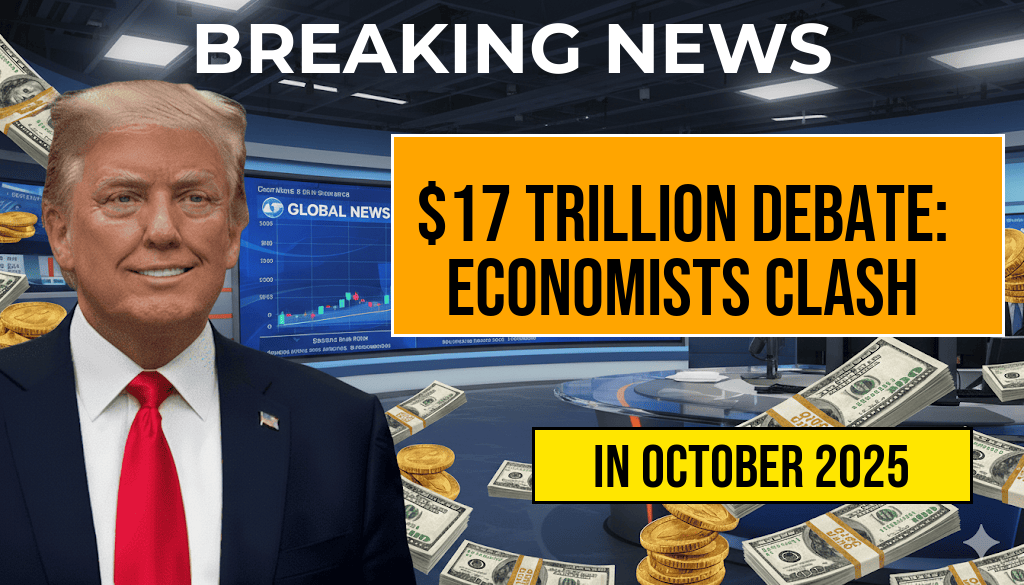Amid mounting scrutiny of President Donald Trump’s global financial dealings, recent estimates suggest that his international investments could total approximately $17 trillion. This figure has ignited a heated debate among economists, financial analysts, and policymakers over the accuracy of official disclosures, the true scope of his overseas assets, and what these holdings reveal about the intersection of politics and global finance. Critics argue that the size and complexity of Trump’s foreign investments raise questions about transparency and potential conflicts of interest, especially given the lack of comprehensive public disclosures. Conversely, supporters contend that such investments are typical for high-net-worth individuals and do not necessarily imply wrongdoing. As the debate intensifies, experts are calling for clearer accounting standards and more rigorous oversight to better understand the full extent of the former president’s international financial footprint.
Estimating the Magnitude of Trump’s Global Holdings
Calculations suggesting that Donald Trump’s overseas investments could be valued at around $17 trillion are based on a combination of publicly available data, financial disclosures, and expert estimates. This figure encompasses a wide array of assets, including real estate holdings, business ventures, stakes in foreign companies, and other financial instruments across multiple continents. While the U.S. Securities and Exchange Commission (SEC) requires certain disclosures from public officials, critics argue that these disclosures often lack the granularity needed to fully understand the scope of international holdings.
According to a recent analysis by financial researchers, the estimate derives from aggregating known assets such as:
- Trump’s extensive real estate portfolio, including properties in key global markets like London, Dubai, and Istanbul.
- Ownership interests in international licensing and branding deals, notably in the hospitality and entertainment sectors.
- Investments in foreign corporations and joint ventures, some of which are held through offshore entities.
While some of these assets are publicly documented, others are more opaque, prompting questions about the full extent of his international financial footprint. Experts caution, however, that such a broad estimate may overstate or understate actual holdings, given the private nature of many assets.
Economic Experts Clash Over Transparency and Potential Conflicts
Concerns Over Disclosure and Transparency
Many economists and political analysts point out that the lack of comprehensive disclosure hampers efforts to assess potential conflicts of interest. Financial disclosure laws require high-level officials to reveal certain holdings, but critics argue these disclosures often omit significant details, especially regarding offshore investments and private assets. This opacity fuels suspicion that some of Trump’s foreign holdings might influence policy decisions or benefit his businesses.
Legal and Ethical Debates
Legal experts note that while owning foreign assets is not inherently illegal, the failure to properly manage conflicts of interest can lead to ethical dilemmas. The Office of Government Ethics (OGE) has issued guidelines emphasizing the importance of divestment or recusal in cases where personal financial interests could influence official actions. For Trump, whose extensive international business empire blurs lines between private wealth and public service, these boundaries are often difficult to delineate.
Implications for U.S. Policy and International Relations
The debate over Trump’s foreign investments extends beyond academic discourse, touching on national security and diplomatic concerns. Large overseas assets, particularly in politically sensitive regions, can create vulnerabilities or influence diplomatic stances. Critics argue that foreign governments or entities could leverage these investments for favorable treatment or to sway policy decisions.
Supporters counter that such investments are common among wealthy individuals and do not necessarily compromise national interests. They emphasize the importance of transparency and adherence to ethical standards to mitigate any potential conflicts.
Calls for Reform and Greater Oversight
As public interest grows, lawmakers and watchdog groups are advocating for stronger policies to monitor and disclose foreign holdings of public officials. Proposed reforms include:
- Mandatory detailed disclosures of offshore assets.
- Regular audits of foreign investments by independent agencies.
- Clearer guidelines on recusal and conflict management for officials with extensive international holdings.
Expert Opinions
| Stakeholder | Position |
|---|---|
| Economists | Advocate for transparency to prevent conflicts of interest and promote trust in public institutions. |
| Legal Analysts | Highlight the importance of strict adherence to disclosure laws and ethical standards. |
| Supporters | Argue that extensive foreign investments are typical for individuals of Trump’s financial stature and do not inherently pose risks. |
Looking Ahead
As the debate continues, the focus remains on balancing the rights of wealthy individuals to manage international investments with the need for transparency and accountability in public service. The controversy underscores longstanding challenges in tracking and regulating the financial ties of high-profile political figures. For now, the $17 trillion figure serves as a stark illustration of the complexity and scale of modern global finance—highlighting the importance of ongoing reforms and vigilant oversight.
Frequently Asked Questions
What is the main focus of the debate surrounding Trump’s global investment figures?
The debate centers on the accuracy and implications of Trump’s reported $17 trillion in global investments, with economists analyzing whether these figures reflect actual investments, potential risks, or political rhetoric.
How do economists view the impact of Trump’s global investments on the US economy?
Economists are divided; some believe that Trump’s investments could bolster economic growth and international trade, while others warn they may introduce risks or suggest economic disparities.
What methods are used to estimate the size of Trump’s global investment portfolio?
Experts utilize financial disclosures, international financial data, and economic models to approximate the scale of Trump’s investments, though estimates vary due to transparency and complexity.
Why do economists disagree over the significance of the $17 trillion figure?
The disagreement stems from differing interpretations of what constitutes investment value, asset valuation, and the political context, leading to varied assessments of its economic impact.
What are the potential global economic implications if Trump’s investment figures are accurate?
If accurate, these figures could imply a significant influence on global markets, foreign policy, and international economic stability, raising questions about regulation and investment transparency.

Leave a Reply